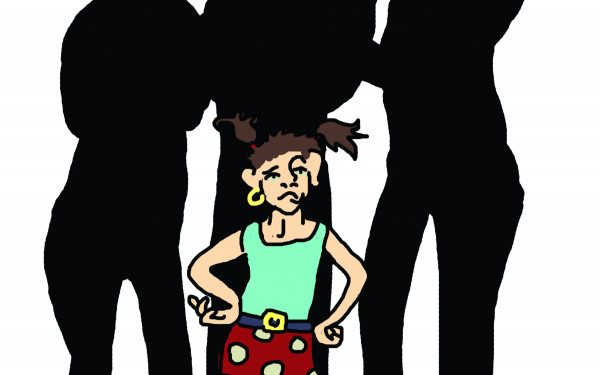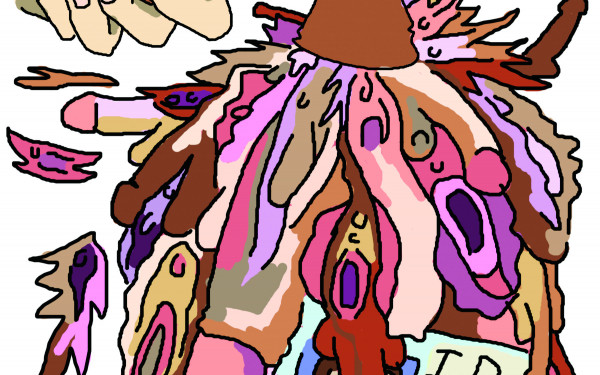Where are the Queer Psychology courses at Concordia?
Concordia students demand more Queer representation in psychology department’s curriculum, so where are the courses dealing with gender and sexuality? Photo Courtesy Caroline Marsh
Students demand addition of a sexuality course to curriculum, psychology department claims there are barriers in the way
Psychology students at Concordia may be wondering why there aren’t any courses that address queer theory, gender and/or sexuality within the department.
In the entire curriculum, the only course that addresses gender and sexuality is PSYC 340: Fundamentals of Psychopathology, and many students believe this class inaccurately portrays both queer and non-queer people’s lived experiences. Over the years, the growing demand for a course that focuses on sexuality in a non-pathologizing way has caught the attention of faculty and staff, so what’s holding them back?
The chair of psychology, Dr. Aaron Johnson, said the reason such a course doesn’t exist yet is because the psychology program at Concordia is accredited by both l’Ordre des Psychologues du Québec and the Canadian Psychological Association. These barriers, he said, necessitate the department keep enough sections of grad school prerequisites open to students who need them.
However, Zoe Greenberg, a mature Concordia psychology student, said she found that the University of British Columbia and McGill both offer a psychology course on sexuality, and the University of Toronto, along with l’Université de Montréal, offer two.
“It’s the kind of thing that makes me want to change schools since I need mentorship concerning best practices,” said Alice Gendron, a psychology student who hopes to work with an LGBTQIA2+ clientele.
They added that being queer isn’t some sort of pathology that can be measured using the Diagnostic and Statistical Manual of Mental Disorders (DSM), so it’s important that psychology students learn how to empathize with and understand queer experiences.
They said an introductory course on sexuality should be mandatory for all psychology undergraduates because, according to a VICE article, less than half of Generation Z identifies as exclusively heterosexual. This means that every psychologist will encounter queer people during their career.
“It’s the kind of thing that makes me want to change schools since I need mentorship concerning best practices,” — Alice Gendron
“Even somebody who isn’t going to specialize in queer psychology like I am needs to understand [queer experiences],” Gendron said.
They remarked that it can be very difficult for queer people to reach out to a therapist out of fear that their experiences will be pathologized due to the archaic nature of some DSM diagnoses.
Greenberg created a petition in December 2021 demanding that Concordia implement a psychology course that addresses gender and sexuality.
“I don’t identify as queer, so I’m very careful not to take up space,” she said. However, as a former sex worker and a sexual assult survivor, there have been moments where she felt inadequately represented in the content of certain courses.
“I think there may be a gap between the psychological research that’s available and the reality of people’s lived experiences,” Greenberg said.
“Professors mostly discuss gender in terms of biology [and] either female or male,” said Catherine Papadakis, a second-year psychology student. They added that it’s an inaccurate way to discuss gender, especially considering the ever-evolving discourse around it.
Sarah Mangle, a mature undergraduate psychology student, said that when a program that is responsible for training future psychologists doesn't provide a nuanced discourse around gender and sexuality, they aren’t adequately preparing students.
She added that LGBTQIA identities have a long history of having been researched, but the OPQ doesn’t see this history as important enough for future psychologists to learn. This causes universities like Concordia to not have gender and sexuality psychology courses in the curriculum.
“There is a myth that not much is known about queer and trans people,” Mangle said, “but we’ve been studied (and it’s documented) since at least the 1850s within European and North American contexts.”
Johnson maintained that any changes to the program need to be approved at multiple levels within the university and the province. Currently, the department’s efforts have been towards introducing a new degree option and conducting an entire undergraduate curriculum overhaul at the same time. Such changes take about three years to get approved by all the levels of government, he said.
“It’s basically human Tetris. We’re trying to put on enough content and variety of content so that students will then be able to complete their degree within a timeframe—theoretically—of three years,” said Johnson.
But the department isn’t closed to the idea of creating a new psychology course. Johnson explained that there is a process for when a faculty member wants to add a new course to the program. They will usually present their pitch to the undergraduate curriculum committee, a standing committee that meets at least once a month and that contains a student representative. Before it is approved, however, the department must find at least two people willing to teach it.
Lucia Farisello, a part-time faculty member, believes that the petition is an excellent way to show the department that students want psychology courses on gender and sexuality.
Her name is included in the petition as a professor who would be willing to teach gender and sexuality, which she attributes to Greenberg wanting to show faculty support for the course.
“It truly is unfortunate that we dont have any sex-positive [courses or that we don’t] learn about Queer Theory”, said Farisello. Nonetheless, she believes that the department will be receptive to the petition.
You can sign the petition here.



_600_375_90_s_c1.jpg)
_600_375_90_s_c1.jpg)